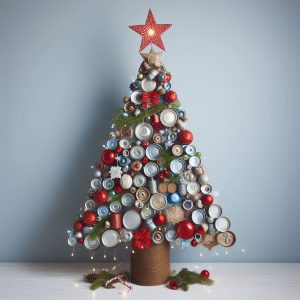Christmas is a magical time full of gifts, decorations and family celebrations.
However, it is also a period in which a large amount of waste is generated, especially plastics.
From gift wrapping to Christmas decorations, it’s important that we take responsible steps to reduce our environmental impact.
In today’s blog we share some ideas for recycling and reusing plastics during these holidays.
Identify recyclable plastics
The first step to effective recycling is to identify what type of plastics can be recycled.

Recycle plastic at Christmas
Gift packaging often includes a mix of materials, such as paper, plastic and metallics, which make it difficult to recycle. Here are some recommendations:
- Plastic films: Be sure to separate clean plastic wrap from other materials. Plastics marked with codes 1 (PET) and 2 (HDPE) are usually recyclable.
- Decorations: Avoid throwing garlands or plastic decorations in the general trash. Many times, these can be reused or recycled at specific points.
Reuse before recycling
Reusing is one of the best ways to reduce waste generation. Here are some ideas:
- Wrap your gifts creatively: Use fabric, kraft paper or recycled paper bags. You can decorate these materials with bows or homemade drawings to give them a unique touch.

Recycle plastic at Christmas
- Transform your decorations: If you have plastic decorations that you no longer use, give them a second life. For example, you can paint old plastic spheres to create a new design or turn garlands into crafts.
Take your Christmas plastics to a specialized recycling point
Not all plastics can be recycled at home. Therefore, it is important to look for specialized recycling points, such as those offered by companies dedicated to the recovery of plastic waste. These companies process complex materials, such as mixed or laminated plastics, that are not accepted in traditional recycling systems.
Opt for sustainable alternatives
One way to reduce the use of plastics is to opt for more sustainable materials in your Christmas celebrations:
- Natural decorations: Use tree branches, pine cones or dried fruits as decorations.

Recycle plastic at Christmas
- Plastic-free gifts: Choose products that come in recyclable or packaging-free packaging.
Educate your family and friends
Christmas is also an excellent opportunity to share the message of sustainability. Encourage your loved ones to recycle and adopt environmentally responsible habits. It is clear that Christmas, with its charm and celebration, also generates a significant amount of plastic waste.

Recycle plastic at Christmas
Taking advantage of these holidays to recycle properly not only reduces the environmental impact, but also encourages more responsible consumption. By separating plastics according to their type and taking them to appropriate recycling points, you help give them a new life, minimizing their ecological footprint. Opting for reusable packaging, decorations made from recycled materials and avoiding single-use products are small gestures that make a big difference. In our company, we are dedicated to transforming this waste into valuable resources, promoting a sustainable cycle for plastic. This holiday season, let’s make sustainability a tradition. Together, we can turn Christmas waste into opportunities to care for the planet, showing that the Christmas spirit also includes responsibility for our environment. Let’s recycle for a greener future! Merry christmas!







